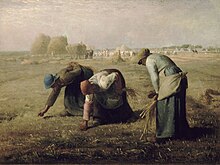
Back لقاط Arabic Paběrkování Czech Ährenlesen German Spikumado Esperanto خوشهچینی Persian Glanage French Rebusco Galician לקט ופרט HE Ịchịcha IG 落穂拾い Japanese

Gleaning is the act of collecting leftover crops from farmers' fields after they have been commercially harvested or on fields where it is not economically profitable to harvest. It is a practice described in the Hebrew Bible that became a legally enforced entitlement of the poor in a number of Christian kingdoms.[1][2] Modern day "dumpster diving", when done for food or culinary ingredients, is seen as a similar form of food recovery.[3] Gleaning is also still used to provide nutritious harvested foods for those in need. In the United States, it is used due to the need for a national network to aid food recovery organizations. This is called the National Gleaning Project,[4] which was started by the Center for Agriculture and Food Systems at Vermont Law and Graduate School to aid those less fortunate much like the old Christian Kingdoms.
- ^ Hussey, Stephen (1997). "'The Last Survivor of an Ancient Race': The Changing Face of Essex Gleaning". The Agricultural History Review. 45 (1): 61–72. JSTOR 40275132.
- ^ Carpenter, Eugene E. (2000). Holman Treasury of Key Bible Words: 200 Greek and 200 Hebrew Words Defined and Explained. B&H Publishing Group. ISBN 978-0-8054-9352-8. Retrieved 2013-08-06.
- ^ Marshman, Jennifer; Scott, Steffanie (January 2019). "Gleaning in the 21st century: Urban food recovery and community food security in Ontario, Canada". Canadian Food Studies. 6 (1): 100–119. doi:10.15353/cfs-rcea.v6i1.264. hdl:10012/9736. Retrieved 1 December 2020.
- ^ National Gleaning Project